Brotherly advice: Enjoy your vocation!
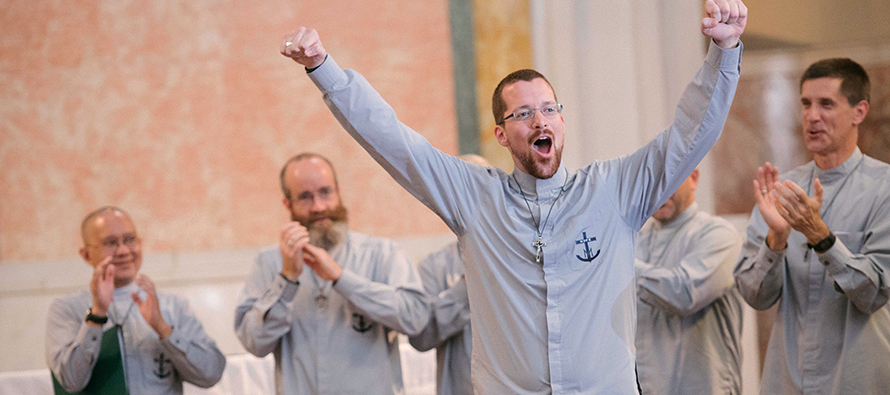
Image: Brother Parker Jordan, B.H. rejoices at his final vows ceremony.
One of the most important decisions of Parker Jordan’s life was choosing between the University of Florida and Florida State University for college—and it had nothing to do with the Seminole/Gator football rivalry.
Jordan was torn. When the FSU acceptance letter came, complete with a generous scholarship, Jordan checked the “maybe” box on the return postcard, only to later change it to “yes” before mailing it in. “Ultimately it was a decision for God,” Jordan, now 29, recalls. “The Lord was leading me there.”
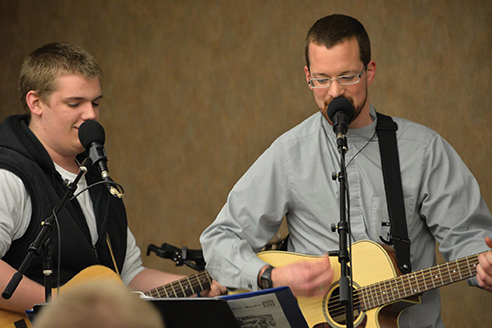
Jordan didn’t know it at the time, but his college decision would provide the answer to a prayer he’d had for years: “Lord, what do you want me to do with my life?”
He would find his vocation with the Brotherhood of Hope, an order of Catholic priests and brothers that were Jordan’s FSU campus ministry connection. Founded in 1980 by New Jersey priest Father Philip Merdinger, the brothers minister primarily at colleges and universities.
Trailhead to vocation
Although Jordan grew up in a religious family, he didn’t seem destined for religious life. In fact, he wasn’t even Catholic. His parents were both evangelical Protestants: His father was the son of a Methodist pastor; his mother spent her childhood in India with her missionary parents. Still, that religious pedigree and grounding had an impact on young Jordan. “We always knew Parker was going to be somebody different—‘fully given’ in one way or another,” his mother, Heather, says.
Eventually, Jordan’s parents and their six children converted to Catholicism on Pentecost Sunday 1998, when Jordan was 12.
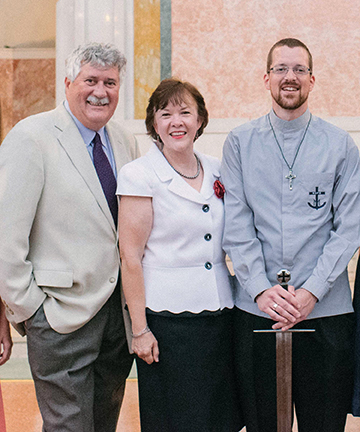
The family began attending St. Thomas More Parish at Florida State University, where they connected with the Brotherhood of Hope. (A number of religious vocations to priesthood and religious life would come from that vibrant parish.)
Both Heather and Thom Jordan encouraged their children to listen to God’s plan for their lives. “We always taught Parker, ‘You’ll only be happy when doing what God calls you to do,’” says Heather, whose family often hosted brothers for dinner.
Brother Jude Lasota, who was working in campus ministry at FSU at the time, remembers young Jordan as incredibly intelligent and having a maturity that was “exemplary, even as a young boy.” The oldest of six children who were all home-schooled by their mother, Jordan had many responsibilities for his siblings. “We always kid him that he’s one of the few brothers who knows how to change a diaper,” Lasota says.
Inspired by the brothers and their evangelistic work, Jordan felt some attraction to a religious vocation in high school, but his response had been mostly to worry about it, what he jokingly calls “vocation anxiety syndrome.” In college, he realized that before he could make such a major decision, he “needed to get to know the Lord first, to take the time to develop that relationship.”
Jordan spent more time with the brothers in college, finding a mentor in Brother Gary Davis, B.H., “There was something natural about it. It fit well, like an old pair of jeans,” Jordan says about the order. Although he had known about the brothers’ life in community and ministry on college campuses, Jordan began to learn more about their spirituality and prayer life.
It wasn’t a journey he took alone. The members of the community of friends Jordan made through the FSU Catholic Center also were trying to figure out God’s call for them. “The brothers helped foster a culture of discipleship that led people to seek the Lord’s calling,” says Jordan, who was majoring in biochemistry with an eye toward medical school.
As his prayer life deepened, his desire to become a doctor lessened, though he continued with his pre-med major and still took the MCAT test for medical school. When a friend two years ahead of him in school decided to pursue the brotherhood, Jordan remembers thinking, “Ah, cool. He’s normal. Maybe I could give this a shot.” The more he prayed about it, the clearer his calling became. Slowly, his anxieties and doubts began to be replaced with contentment and joy.
Break in the clouds
In fact, it was the happiness and joy of the brothers—as well as their commitment to living an intentional life of evangelization—that inspired Jordan. He wondered if he, too, could be happy in the same way, especially as he considered the issue of celibacy. As several of the brothers shared their own stories, Jordan realized, “They’re not married and not having sex, but they’re super joyful and happy.”
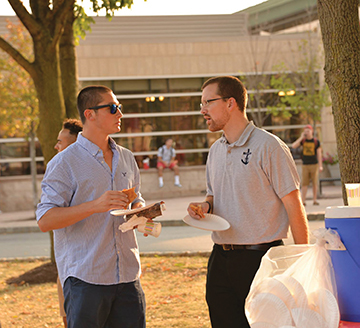
He and his girlfriend had broken up during their freshmen year of college, and Jordan felt he needed to learn more about himself before doing any more dating. “I just didn’t have the internal green light on that,” he says. “Something else was tugging at my heart, that actually the Lord might have something else in store for me.”
Yet, although he found the brothers’ life attractive, the idea that he might be called to it also “freaked me out a bit,” he says.
His question, in prayer, became: “Is Jesus enough for me?”
The answer came in reading the writings of Saint Teresa of Avila, the 16th-century mystic who had first assumed a life dedicated to God would be a burden. But in one of her poems, she wrote: “After a night of prayer, He changed my life when He sang, ‘Enjoy Me.’”
That reminder that religious life was something to enjoy, not an obligation, was a turning point for Jordan. He decided to officially begin formation with the Brotherhood of Hope after college. His mother was not surprised but knew it would be difficult to let her oldest child go. “But we know Parker listens to God, and we could trust what God was saying to him,” she says.
Knowing the brothers personally made it easier, not only for his parents but for his younger siblings. At the party following his final vows, each sibling publicly affirmed that they willingly gave their brother to the brotherhood.
On his way
Jordan’s first job as a candidate in the pre-novitiate was at Northeastern University in Boston, where he worked with other brothers in campus ministry. Jordan found the year of service valuable. “It’s very important when you’re discerning [religious life] to give of yourself and get outside of yourself,” he says.
Next came the novitiate, a more intentional time of formation spent in study, service, and prayer at the brothers’ former house in Cambridge, Massachusetts. The following year Jordan began working at Boston University, moving after one year to Rutgers University in New Jersey, where he currently does outreach with undergraduates. One of his favorite parts of his job is overseeing twice-yearly student-led retreats and helping young men discern their own callings, whether to marriage or religious life.
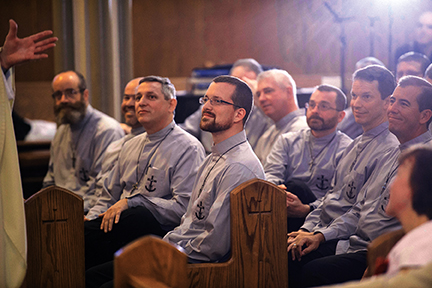
Brother Lasota, who now works with Jordan at Rutgers, says the younger brother is a gifted evangelist who can open doors with young people. “When he preaches the gospel, the grace of his vocation and his person are a great witness, particularly to young men and women,” Lasota says. “They see how free he is and how his vocation made him freer. He’s a magnet and really exudes joy.”
Such a witness can be countercultural on sex-saturated college campuses. As celibate men with few possessions, the brothers model that something besides sex and money can lead to joy and happiness.
“The vocation of brother really stands in contradiction to the way of the world that seeks to live for the moment and with a ‘what can I get out of life’ attitude,” Jordan says.
Yet many college students—even Catholic ones—have never encountered any brothers. The number of religious brothers has dropped dramatically over the past 50 years, according to a recent report from the Vatican Congregation for Institutes of Consecrated Life and Societies of Apostolic Life that refers to religious brothers as “prophets for our time.”
Jordan agrees, comparing brothers to signposts who point to something greater, like John the Baptist pointing to Jesus.
The brothers Jordan knew growing up were a signpost for him; now he wants to be that for other young people. His message to them is also the charism of the Brotherhood of Hope: “the all-sufficiency of Christ.”
“Jesus alone is enough for us,” says Jordan. “He satisfies the deepest desire of the human heart.”
Related articles: vocationnetwork.org, “My unlikely journey to brotherhood,” Vision 2016; “Why I love being a brother!” VISION 2012.
Tags
Related
- Better together: Profile of Brother David Relstab, O.S.A.
- The secret’s out: Brotherhood is powerful
- Brothers win the race: Profile of Brother Rafael Vargas, S.D.B.
- God called me to be a brother
- Modern “prodigal son” meets the brothers: Profile of Brother Ray Morris, B.H.
- Brotherhood is right for me
- Big Brother is watching you
- Why did I become a brother?
- Brother Mark Elder makes an art of spirituality
- How God tricked Duc Pham into becoming a brother Read More
Most Viewed
- Find your spirituality type quiz
- FAQs: Frequently asked questions about vocations
- Celibacy quiz: Can you live a celibate life?
- Resources for older discerners or those with physical and developmental differences
- About Vocation Network and VISION Guide


